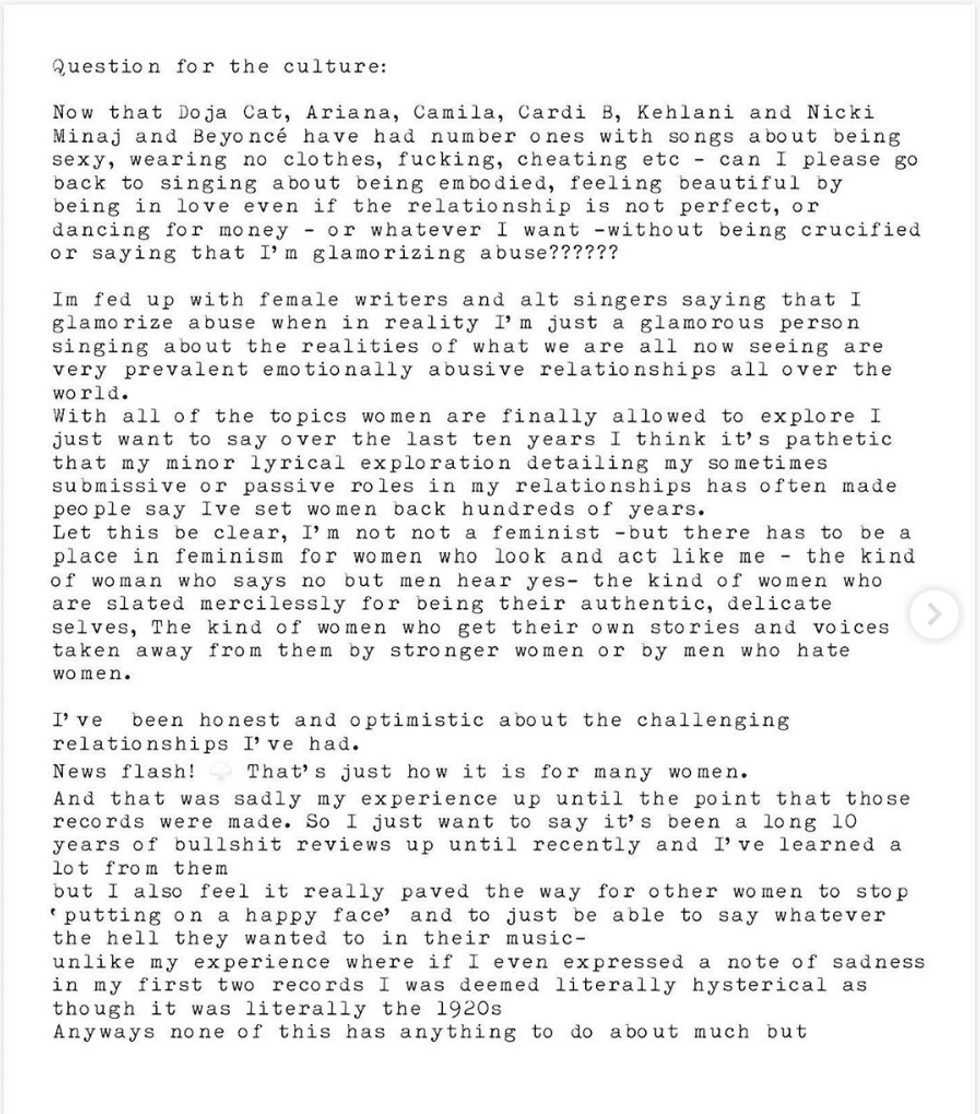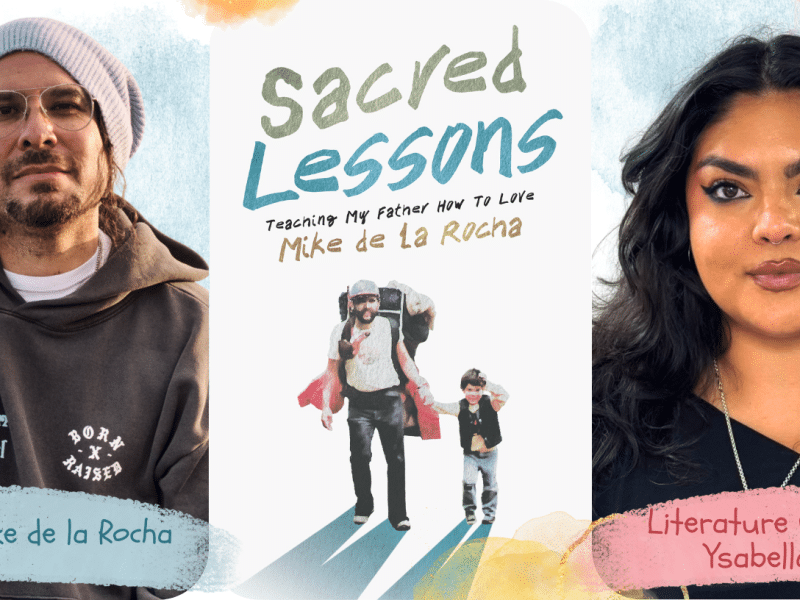The Reckoning of (Fu)Lana Del Rey
Bless me, Father, for I have sinned. It has been thirty-four years since my last confession…

Bless me, Father, for I have sinned. It has been thirty-four years since my last confession…
Actually, fuck that shit! I’m a proud queer sangrona with something to get off of my tattooed chest and so I’m gonna offer myself up to womxn of color to beg for absolution: When my lesbo marriage was crumbling, I listened to la música de (Fu)Lana Del Rey. A lot.
Lo siento. I had a case of the sads and I tried washing them away in sad, tacky music.
In spite of the depressed haze I lived in, I could see what Elizabeth Woolridge Grant, that’s the name her rich parents gave her, made her “art.” Como pulga, she hopped from culture to culture, engorging herself on our delicious blood, hers tastes like nothing, and WE are what plump her fake lips, sangre she stole por celos, envidia. I’m guilty: I listened to Fulana in spite of her canibalismo cultural. I listened to her groan about the blues getting old. I listened to her warble that Elvis is the best. I listened to her croon that being hit feels like a kiss.
Fulana likes to play as if she loves to take it but she knows how to give it, too. Sabe como golpear. She owns brass knuckles, y el otro día, in the middle of Karentine, she slid them on and took a swing at womxn of color.
To be precise, she came for Black womxn, placing several of this country’s greatest living talents on a trumped-up shit list she posted to Instagram: “Now that Doja Cat, Ariana, Camila, Cardi B, Kehlani and Nicki Minaj and Beyoncé have had number ones with songs about being sexy, wearing no clothes, fucking, cheating etc – can I please go back to singing about being embodied, feeling beautiful by being in love even if the relationship is not perfect, or dancing for money – or whatever I want – without being crucified or saying that I’m glamourizing abuse??????”

Source: The Standard
Fulana, do you realize that the only one crucifying you is you??????
You built your cross and climbed it yourself!!!!!!
Pos, I say déjala ahí. Let the crows circle her career. She’s profited off of us enough to keep her lips fishily juvedermed from here to eternity.
Toward the end of her IG rant, Fulana proclaims that she “paved the way for other women to stop ‘putting on a happy face’ and to just be able to say whatever the hell they wanted to in their music…” As if Poly Styrene never swayed onstage screaming, “Some people think little girls should be seen and not heard/But I say…/Oh Bondage! Up yours!” As if Alice Bag never pogoed on stage chanting, “Violence girl!” GTFOH, Hannah de la Montana.
Because WASPs are low-key murder hornets, they never apologize. They strike back. Womxn of color called Fulana out, we explained to her why her letter was nasty, and she doubled down, claiming that she’s sticking up for “people who don’t look strong…it’s about advocating for a more delicate personality.”
Some people might accuse me of being extra for this but I think that Toni Morrison’s critique of Willa Cather’s novel “Sapphira and the Slave Girl” could easily be applied to a reading of Fulana. In “Playing in the Dark: Whiteness and the Literary Imagination,” Morrison described Sapphira Dodderidge Colbert, the white mistress, not as “mean” or “vindictive” but as “desperate.” Así huele Fulana. Her little rant reeks of desesperación just as all of Karentine does. During this pandemic, many white women have faced racial ennui. They stare into the mirror, only to realize they are stuck with…themselves.
Both Sapphira and Fulana are “troubled, disappointed wom[e]n confined to the prison[s] of [their] defeated flesh,” and like the mistress, Fulana occupies a “social pedestal [that] rests on the sturdy spine of racial degradation.” Herein lies a gendered rub: Fulana can’t claim she opposes degradation. In fact, she loves it! She monetizes it, priding herself on being female degredation’s most glamorous ambassador, connoisseur and apologist. Remember, in Fulana’s universe, beating the shit out of someone is just another way of saying I love you.
I invited womxn of color to discuss with me whether or not taking swings at us feels like love. All replied that no, that’s abusive bullshit, and every womxn expressed to me that Fulana is BP: beyond problematic. “Black womxn have built several musical genres so how dare she fix her mouth to drag us down when we have fought so hard to make it,” says Jamilla Vandyke-Bailey, a 26-year-old Black womxn who works as a teacher. “Her problem is with the patriarchy and instead of taking it out on them, she took it out on womxn.”
Just as Sapphira “escapes the necessity of inhabiting her own body by dwelling on the young, healthy, and sexually appetizing [slave girl] Nancy,” Fulana dwells on, in and through the bodies of womxn of color, attempting to escape her whiteness by inflating her liplessness, dancing around a campfire in a Native American headdress, and boosting a Hispanicized pseudonym from a Floridian retirement community. “I wanted a name that sounded sort of exotic,” she once mused about her burrito supreme moniker.

(Image from music video Ride)
Her explanation makes me gag…exotically.
“I don’t like her,” says Selene Preciado, a 37-year-old Mexican womxn who works as an independent curator. “When she first came out, I got excited because I thought she was Latina but she’s a total poseur. I don’t believe a sentence she sings.” María José Maldonado, a 37-year-old Latinx womxn who works as a writer, says, “Rich pretty White girl tears are the sweetest…for White girls. To me, they salty AF. I have met many pretty, rich White girls who slut-shamed me, a pretty Latinx girl on financial aid, even though these White girls had more sexual partners than I did. They shamed me because they, like Lana, rejected anything outside of their demure, White, ‘pure,’ femininity.”
Fulana plucks hypersexualized tropes from donde sea and pantomimes them melodramatically, wearing them out until they no longer serve her ego. Once finished, she discards them como si fueran un par de calzones aguados. For her Summertime Sadness video, she temporarily became a suicidal lesbian attracted to heights. For her short film Tropico, she poached my primas’ wardrobes, hijacking chola chic right down to the calcetines.
About this exploitative flick, Josefina De La Torre, a twenty-four-year old Mexican, says, “The scenes with Lana hanging with a group of Brown womxn in a ‘barrio’ made me uncomfortable. These womxn who looked like my friends, cousins, and tías, were reduced to a chola/spicy seductive Latina stereotype. Seeing a White womxn highlight herself as an ‘angel’ amongst these womxn whom she cast as her aesthetic background angered me.”
Morrisson wrote that White womxnhood is a “privileged gender” with nothing to elevate it “except color,” and White womxn have used my mestiza body, both casually and viciously, in order to maintain their spot atop the pedestal. When they’ve used me, I have felt it.
And Fulana plays that same game. From its pedestal, White womxnhood flexes its power. It’s monopoly on virtue, on fragility, on being delicate, is its pleasure. This transforms the rest of us into walking holes.
But we aren’t that. We’re far from it. And though Fulana runs her mouth, she could never hang with actual cholas, gangsters, or veteranas and so I’ll close with a message from my prima, La Green Eyes, the one with a tattoo on her shoulder that reads, “Fuck love and fuck you 2.”
Last summer, Green Eyes and I sat on equipales, sipping margaritas al fresco at La Placita Olvera. We were having a good time, laughing hard, talking shit, catching up. Then, Green Eyes whispers to me, “What the fuck is up with this bitch?” She gestured with her chin at a blonde lady with a shitty haircut who was mad dogging us. You could tell she was gearing up to call the manager. She wanted to rat us out for having too much fun in her sour presence.
“Hey!” Green Eyes screamed at her. The chick looked shaken. Lol. “Hey! KAREN! WHAT THE FUCK ARE YOU STARING AT? At least we aren’t TOURISTS.”
The Karen trembled, my prima and I laughed, we clinked glasses, and emptied the tequila.




